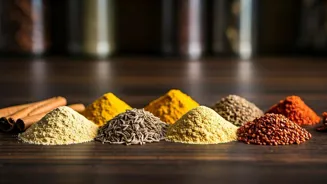Cinnamon's Cholesterol Combat
Cinnamon, a beloved spice found in kitchens across the globe, possesses remarkable properties that can significantly influence cholesterol levels. Numerous
studies have highlighted cinnamon's ability to reduce LDL (bad) cholesterol, triglycerides, and overall cholesterol. The potent compounds in cinnamon, specifically cinnamaldehyde, are believed to mimic insulin, improving glucose metabolism and subsequently reducing cholesterol production in the liver. Furthermore, the spice can help prevent the buildup of arterial plaque, thereby aiding in preventing heart-related diseases. Cinnamon is not just a flavour enhancer; it is a health enhancer. You can easily add cinnamon to your diet in various ways, such as sprinkling it on your morning oatmeal or adding it to your coffee. Consuming as little as half a teaspoon of cinnamon daily can yield positive results.
Ginger's Heart-Healthy Boost
Ginger, a staple in many Indian dishes, offers a wealth of health benefits, including those related to cholesterol management. Ginger contains antioxidants and anti-inflammatory compounds that help reduce LDL cholesterol and triglycerides, and also elevate HDL (good) cholesterol levels. The bioactive compounds in ginger, such as gingerol, aid in inhibiting the absorption of cholesterol from the gut and improving its removal from the body. Regular consumption of ginger has shown promising results in improving lipid profiles, especially in individuals with hyperlipidemia (high cholesterol). Ginger can be incorporated into your diet through various channels. Add fresh ginger to your teas, smoothies, or stir-fries. You can also consume ginger supplements, but it's best to consult with a healthcare professional to understand the appropriate dosage.
Turmeric's Curcumin Advantage
Turmeric, famed for its vibrant colour and earthy taste, is a key player in Indian cuisine and traditional medicine. The primary active compound in turmeric, curcumin, provides a range of health benefits, including notable effects on cholesterol levels. Curcumin’s anti-inflammatory and antioxidant properties have been shown to reduce LDL cholesterol and triglycerides. Furthermore, it helps in protecting against oxidative damage, which can contribute to the development of heart disease. Studies suggest that curcumin can improve the function of the endothelium (the inner lining of blood vessels), thereby improving overall cardiovascular health. To fully benefit from turmeric, it is recommended to combine it with black pepper, as piperine (found in black pepper) dramatically increases curcumin absorption. You can easily include turmeric in your daily diet by adding it to curries, soups, or even smoothies.
Garlic's Cardiovascular Power
Garlic, celebrated for its strong flavour and medicinal qualities, is another valuable spice in the fight against high cholesterol. The active compounds in garlic, particularly allicin, are responsible for many of its health benefits. Garlic helps reduce LDL cholesterol and triglycerides and can moderately raise HDL cholesterol. It also helps prevent the formation of blood clots and relaxes blood vessels, improving blood flow and reducing the risk of heart disease. Studies indicate that regular garlic consumption is linked to improvements in cardiovascular health. The consumption of raw garlic or supplements has shown better results when aiming for optimal cholesterol reduction. Incorporating garlic into your diet is simple, as you can add it to various dishes, from pasta sauces to vegetable stir-fries. Remember to consume it regularly for maximum benefits.
Cumin's Cholesterol-Reducing Properties
Cumin, a staple spice in many cuisines around the world, plays a noteworthy role in cholesterol management. Cumin has the ability to lower LDL cholesterol and triglyceride levels, contributing to improved cardiovascular health. Its antioxidant properties help protect against oxidative stress, further aiding in the prevention of heart disease. Cumin enhances the secretion of bile, which is important for the digestion of fats and the removal of cholesterol from the body. Furthermore, cumin helps in maintaining a healthy gut, which helps to regulate cholesterol absorption. You can easily add cumin to your diet by sprinkling it on vegetables, adding it to soups, or using it in curries. Regular consumption of cumin can improve your cholesterol levels and support your overall health.
Coriander's Cholesterol Benefits
Coriander, also known as cilantro, is a versatile spice known for its fresh, citrusy flavour and its role in promoting cardiovascular health. Coriander seeds are particularly beneficial, with studies indicating their ability to lower LDL cholesterol and triglycerides, which can contribute to better heart health. The compounds found in coriander can enhance the metabolism of cholesterol and improve its elimination from the body. Coriander also contains antioxidants that help protect against oxidative stress, further supporting heart health. To integrate coriander into your diet, add fresh coriander leaves to your salads, soups, or curries. Ground coriander seeds can also be used to season various dishes. Regular use of coriander helps in reducing cholesterol levels naturally.
Fenugreek's Lipid Profile Boost
Fenugreek, an essential spice used in Indian cooking, provides a variety of health benefits, including cholesterol management. Fenugreek seeds contain high levels of soluble fiber, which aids in lowering LDL cholesterol and triglycerides. This fiber helps bind with cholesterol in the digestive tract, preventing its absorption into the bloodstream. Fenugreek seeds also contain compounds that can improve glucose metabolism, which indirectly helps in regulating cholesterol levels. It’s also known to increase HDL cholesterol levels. You can incorporate fenugreek into your diet by adding the seeds to your curries, or by consuming fenugreek-infused water. For those who find the taste intense, supplements are also an option, but always seek guidance from your physician.
Cardamom for Heart Health
Cardamom, a highly valued spice with a distinct flavour, also contributes positively to heart health by impacting cholesterol levels. Research shows that cardamom can help in reducing LDL cholesterol, triglycerides, and improving overall lipid profiles. The antioxidants found in cardamom assist in protecting against oxidative stress and reducing inflammation, key factors in preventing heart disease. Cardamom can also improve blood circulation, further benefiting cardiovascular health. You can easily add cardamom to your diet by using it in teas, coffees, or baking. It can also be used to flavour curries and desserts. Regular consumption of cardamom can support healthy cholesterol levels and contribute to the overall health of your heart.













